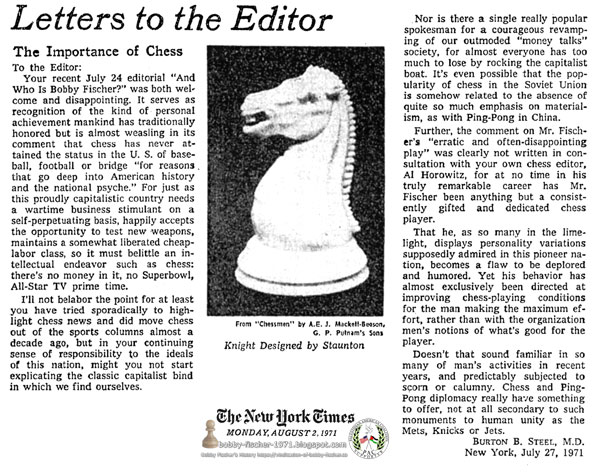New York Times, New York, New York, Monday, August 02, 1971 - Page 22
Letters to the Editor - The Importance of Chess
To the Editor:
Your recent July 24 editorial “And Who Is Bobby Fischer?” was both welcome and disappointing. It serves as recognition of the king of personal achievement mankind has traditionally honored but is almost weaseling in its comment that chess has never attained the status in the U.S. of baseball, football or bridge “for reasons that go deep into American history and the national psyche.” For just as this proudly capitalistic country needs a wartime business stimulant on a self-perpetuating basis, happily accepts the opportunity to test new weapons, maintains a somewhat liberated cheap-labor class, so it must belittle an intellectual endeavor such as chess: there's no money in it, no Superbowl, All-Star TV prime time.
I'll not belabor the point for at least you have tried sporadically to highlight chess news and did move chess out of the sports columns almost a decade ago, but in your continuing sense of responsibility to the ideals of this nation, might you not start explicating the classic capitalist bind in which we find ourselves.
Nor is there a single really popular spokesman for a courageous revamping of our outmoded “money talks” society, for almost everyone has too much to lose by rocking the capitalist boat. It's even possible that the popularity of chess in the Soviet Union is somehow related to the absence of quite so much emphasis on materialism, as with Ping-Pong in China.
Further, the comment on Mr. Fischer's “erratic and often-disappointing play” was clearly not written in consultation with your own chess editor, Al Horowitz, for at no time in his truly remarkable career has Mr. Fischer been anything but a consistently gifted and dedicated chess player.
That he, as so many in the limelight, displays personality variations supposedly admired in this pioneer nation, becomes a flaw to be deplored and humored. Yet his behavior has almost exclusively been directed at improving chess-playing conditions for the man making the maximum effort, rather than with the organization men's notions of what's good for the player.
Doesn't that sound familiar in so many of man's activities in recent years, and predictably subjected to scorn or calumny. Chess and Ping-Pong diplomacy really have something to offer, not at all secondary to such monuments to human unity as the Mets, Knicks or Jets.
Burton B. Steel, M.D. New York, July 27, 1971























